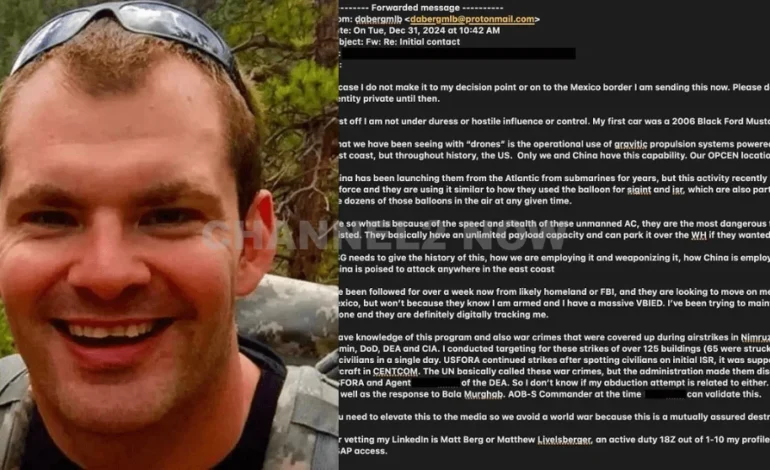
Matthew Livelsberger Obituary and Death: Las Vegas New Year’s Day Bombing Suspect Leaves Chilling Manifesto Detailing Alleged U.S. War Crimes, Foreign Threats, and Paranoid Surveillance Claims – GoFundMe Launched to Aid Victims of Tragedy
Matthew Livelsberger Obituary and Death: Las Vegas New Year’s Day Bombing Suspect Leaves Chilling Manifesto Detailing Alleged U.S. War Crimes, Foreign Threats, and Paranoid Surveillance Claims – GoFundMe Launched to Aid Victims of Tragedy
In the aftermath of the New Year’s Day bombing at the Trump International Hotel valet area in Las Vegas, disturbing new details have emerged about Matthew Livelsberger, the suspect behind the attack. Livelsberger, a former military operative, perished in the explosion he orchestrated, leaving behind a chilling manifesto that sheds light on his motivations, grievances, and the psychological torment that led to the tragic events.
The bombing injured multiple individuals and sent shockwaves through Las Vegas and beyond, raising urgent questions about domestic security and the mental health struggles of military veterans. As authorities piece together the complex web of Livelsberger’s life and actions, his manifesto has become a central element in understanding this tragedy.
The Manifesto: A Window into Livelsberger’s Mindset
Sent via email to a contact identified only as “Samosaur” the day before the attack, the manifesto reveals Livelsberger’s deeply paranoid worldview, his claims of witnessing war crimes during his military service, and his belief in impending national security threats.
Claims of Foreign Threats
Livelsberger’s writings prominently feature allegations about advanced gravitic propulsion systems purportedly deployed by China. He claimed these technologies, allegedly launched from submarines, posed an existential threat to the United States. Describing them as “the most dangerous threat to national security that has ever existed,” Livelsberger insisted they were capable of evading detection and delivering catastrophic payloads.
“They can park it over the White House if they wanted. It’s checkmate,” he wrote.
Paranoia and Surveillance
The manifesto reflects Livelsberger’s growing paranoia, as he believed federal agencies, including the FBI and Homeland Security, were monitoring his every move. He detailed his attempts to flee to Mexico, convinced that authorities were poised to apprehend him.
“They are looking to move on me but won’t because they know I am armed and I have a massive VBIED,” he wrote, referencing the vehicle-borne improvised explosive device he later used in the bombing.
Allegations of U.S. War Crimes
Livelsberger also claimed involvement in cover-ups of civilian casualties during airstrikes in Nimruz Province, Afghanistan, in 2019. He alleged that U.S. military and intelligence agencies knowingly targeted civilian structures and suppressed evidence of these operations.
“I conducted targeting for these strikes… 65 buildings were struck despite civilian presence, killing hundreds in a single day,” he wrote, labeling the actions as war crimes.
A Desperate Plea
In the email, Livelsberger urged his contact to share the information with the media, warning of dire global consequences if his claims were ignored. “You need to elevate this to the media so we avoid a world war because this is a mutually assured destruction situation,” he wrote.
Military Background and PTSD Suspicions
The FBI has verified the manifesto’s authenticity, corroborating Livelsberger’s military service and deployment to Afghanistan. Investigators suspect that Livelsberger suffered from untreated post-traumatic stress disorder (PTSD), a condition that may have fueled his descent into radicalization and violence.
The manifesto contained verifiable details, including Livelsberger’s military assignments, references to his LinkedIn profile under the alias “Matt Berg,” and his security clearance level during his service.
The New Year’s Day Bombing
On New Year’s Day, Livelsberger carried out the bombing at the Trump International Hotel’s valet area. The explosion killed Livelsberger and injured multiple bystanders. A subsequent investigation revealed Livelsberger had rented a Tesla Cybertruck in Denver, Colorado, before driving through Colorado, New Mexico, Arizona, and Nevada. Authorities traced his movements using Tesla’s charging station data.
The bombing has prompted heightened security measures across Las Vegas, with increased police patrols on the Strip and in downtown areas.
Community and Victim Support Efforts
In the wake of this tragedy, a GoFundMe campaign has been launched to aid the injured victims and their families, many of whom face mounting medical expenses and emotional trauma. Titled “Support for Las Vegas Bombing Victims,” the fundraiser has garnered significant attention, with donors expressing solidarity and condolences.
“This senseless act has left so many lives shattered,” one donor wrote. “We must come together to support those who were injured and ensure they receive the care they need.”
Related Incidents and Broader Implications
The bombing coincided with another violent event earlier that day in New Orleans, where a driver intentionally plowed a truck into a crowd, killing at least 15 people. While authorities have not found evidence linking the two incidents, the coincidence underscores the urgency of addressing domestic terrorism and mental health crises.
Remembering the Victims and Looking Ahead
As the investigation continues, the focus remains on the victims and the broader implications of Livelsberger’s actions. The tragedy has reignited discussions about the mental health struggles of veterans, the need for robust domestic security measures, and the importance of community resilience in the face of senseless violence.



